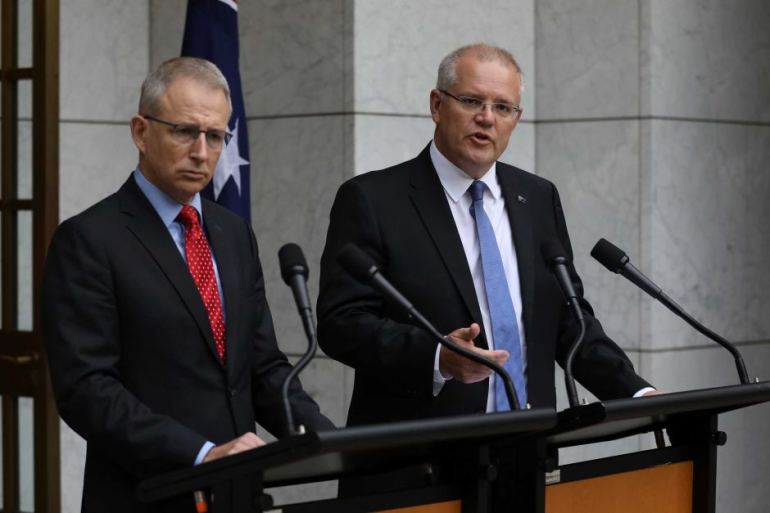Paul Fletcher and Scott Morrison.
The screen sector is hoping the appointment of Paul Fletcher as Minister for Communications and the Arts will signal an end to government policy paralysis towards the industry.
The director of corporate and regulatory affairs at Optus before he entered Parliament in 2009, Fletcher takes over from Senator Mitch Fifield, who is being appointed Australia’s Ambassador to the United Nations.
The industry has welcomed Fletcher’s appointment. “Paul Fletcher is a great choice for the Communications portfolio. He is smart, pragmatic and has a deep understanding of our industry,” a spokesperson for Network 10 said.
“Paul is definitely the right person to be dealing with the big and complex issues that need to be sorted in this area.”
Australian Children’s Television Foundaation CEO Jenny Buckland tells IF: “I think Paul Fletcher’s a great choice – he has experience in the portfolio from his Parliamentary Secretary days and also in previous professional roles and I know he understands the issues that are at play.
“I would expect him to be very cognisant of the challenges that all sectors of the industry are facing with digital disruption and I think he will understand the complex issues around balancing the needs of businesses and audiences, as well as the imperative to complete the review that was started in the previous term of government and develop a regulatory and funding environment that is fit for purpose and takes us into the future.”
Australian Directors’ Guild CEO Kingston Anderson said: “We welcome Paul Fletcher as the new Minister and look forward to working with him on securing the future of the screen industry.
“We see the regulating of the streaming services like Netflix as the priority for the industry. We have had several reviews but no action on this and it is critical for the future of our industry that the government have a clear and supportive policy for the screen industry.”
Fifield won few friends in the screen industry after three and a half years of indecision and vacillation since he took the portfolio previously occupied by Malcolm Turnbull.
He refused to release the Australian and Children’s Screen Content Review conducted by the Department of Communications and the Arts, Screen Australia and ACMA in 2017. And he ignored the House of Representatives and Senate inquiries.
The result has been a policy vacuum with no reform of the outdated local content quotas; no regime to sustain children’s TV; no movement on harmonising the film and TV Producer Offsets or scrapping the 65-episode funding cap on TV dramas; and no requirement for streaming services to invest in local content.
Overhauling the pre-internet era media ownership laws was a major achievement but there was little else to show for Fifield’s reign. Among the few initiatives were the puzzling $30 million handout to Foxtel to cover women’s sports; the $140 million Location Incentive Program; and on, the eve of the election, extending the Post, Digital and Visual (PDV) and Location Offsets to online platforms.
Arguably Fletcher will not take long to familiarise himself with the major challenges in his new role. He served as parliamentary secretary to Turnbull when he was Minister for Communications from 2013 to 2015.
From 1996-2000 he was senior adviser and later chief of staff in the office of the Minister of Communications, Information Technology and the Arts Senator Richard Alston.
“The communications sector serves a vital human need – for people to communicate with each other – and makes a critical economic and social contribution to our nation. As Minister I will aim to take forward policy settings which maximise this contribution,” he said today.
After listing his main priorities as completing the rollout of the NBN and making the internet a safer place, he referred to the “critically important arts sector,” observing: “Australia’s performers and creative artists are world renowned – and make a profound contribution to our national identity.”
Fletcher can expect an early request for a meeting with ABC chair Ita Buttrose and MD David Anderson who are pressing for a five-year funding arrangement for the broadcaster, ending the three-year political cycle.


